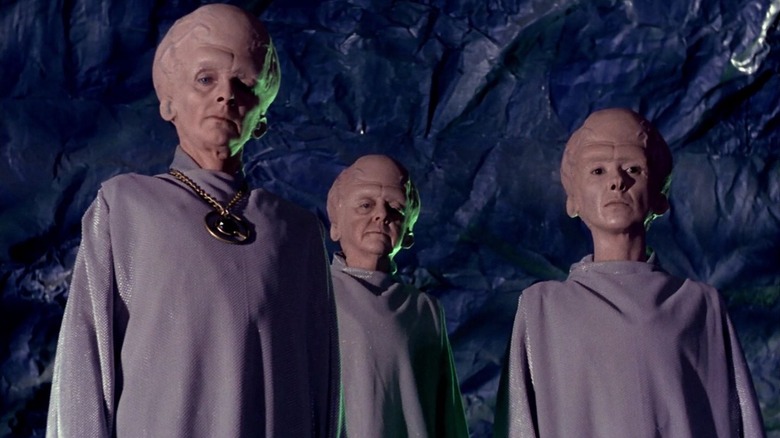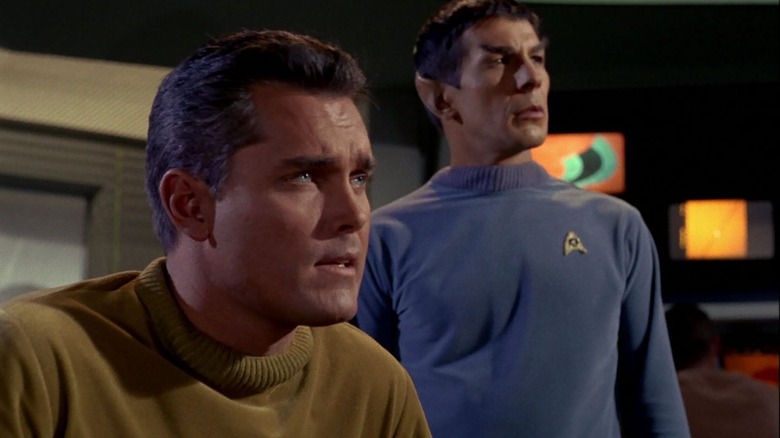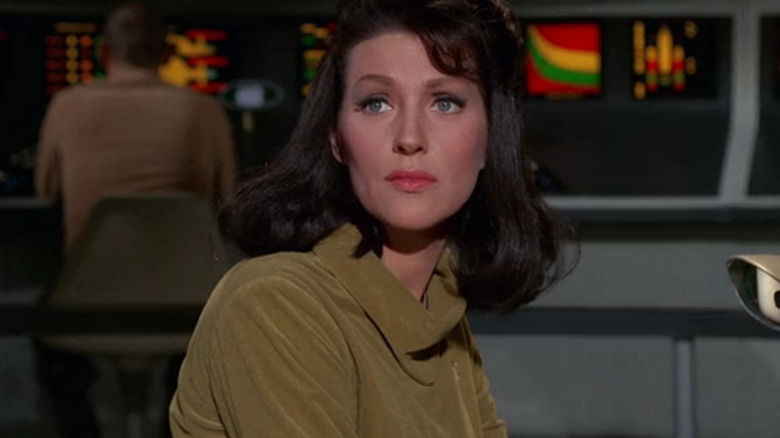Star Trek's First Pilot Deviated From The Norm - And NBC Wasn't Happy With That
The original "Star Trek" pilot, produced in 1966, was never meant to be seen by the public. The episode, called "The Cage," starred Jeffrey Hunter as the serious and temperamental Captain Christopher Pike, commander of the U.S.S. Enterprise. One of his officers was a Vulcan named Mr. Spock (Leonard Nimoy) and his first officer, referred to only as Number One, was played by Majel Barrett. Laurel Goodwin played the captain's personal yeoman and John Lormer played Dr. Theodore Haskins, the Enterprise's chief medical officer.
"The Cage" was about Pike being taken captive by a mysterious species of large-brained psychics called Talosians. They held him in a glass cage and explored his unfamiliar human emotions by projecting psychic illusions into his brain. When they didn't get the results they wanted, the Talosians abducted other Enterprise crew members as well. Pike also found a compatriot in the form of another prisoner, a woman named Vina (Susan Oliver). Eventually, Pike proves to the Talosians that humans don't do well in captivity; our agency is too important to us.
When "The Cage" was rejected by NBC, show creator Gene Roddenberry was given a chance to recast and reshoot a new pilot, so long as it adhered to studio notes. Roddenberry reworked the series to be about a new character, Captain Kirk (William Shatner), and a new crew. Mr. Spock was the only character to carry over from the original pilot. "The Cage" was to be shelved indefinitely.
The aforementioned studio notes were plentiful, but in brief, were intensely critical of how cerebral "Star Trek" was. Where was the action? Roddenberry recalls the notes in a passage from "The Fifty-Year Mission: The Complete, Uncensored, Unauthorized Oral History of Star Trek: The first 25 Years," edited by Mark A. Altman and Edward Gross.
The canonization of Captain Pike
"The Cage," despite being rejected by NBC, would eventually become part of "Star Trek" canon regardless, as the bulk of its footage would be repurposed for a two-part "Star Trek" episode called "The Menagerie." It's not just that Captain Pike preceded Kirk on the production schedule, but now he preceded Kirk as captain of the Enterprise. All the characters from "The Cage" instantly became canonical, and Pike's fate was drawn out explicitly. The Paramount+ series "Star Trek: Strange New Worlds" is about Pike (Anson Mount) and the years he spent in command in between the events of "The Cage" and the revamped pilot, "Where No Man Has Gone Before."
Trekkies will note that "Where No Man Has Gone Before" is a lot more incidental than "The Cage." The original pilot was not an action/adventure story, bearing a closer resemblance to "The Twilight Zone" than the "Star Trek" that would follow it. Gene Roddenberry wrote it that way on purpose. In 1964, his original script received the following note from NBC:
"Be certain there are enough explanations on the planet, the people, their ways and abilities so that even someone who is not a science fiction aficionado can clearly understand and follow the story."
In other words, too brainy.
Roddenberry also felt that sexism played a role. He explained:
"The reason they turned the pilot down was that it was too cerebral and there wasn't enough action and adventure. 'The Cage' didn't end with a chase and a right cross to the jaw, the way all manly films were supposed to end. There were no female leads then — women in those days were just set dressing. So, another thing they felt was wrong was that we had Majel as a female second-in-command of the vessel."
Eesh.
Number One
The character merely called Number One was described as being staggeringly intelligent, sometimes coldly so. Her brain was compared to a computer and she had a stern command style. Had "Star Trek" been extrapolated from "The Cage," it's likely the character would have been given a name and a more elaborate backstory. Majel Barrett recalled being rejected for the role:
"NBC felt that my position as Number One would have to be cut because no one would believe that a woman could hold the position of second-in-command."
Barrett would remain on the new "Star Trek" as Nurse Christine Chapel, as well as the robotic computer voice. Barrett also played the computer voice on "Star Trek: The Next Generation," as well as the horny, eccentric psychic diplomat Lwaxana Troi. On "Strange New Worlds," Barrett's various roles would be distributed among various cast members. Number One was finally named Una Chin-Riley and is played by Rebecca Romijn. Nurse Chapel is played by Jess Bush. Alex Capp plays the computer.
Gene Roddenberry revealed that the sexist nixing of Number One led to a change in Spock. In his own words:
"Number One was originally the one with the cold, calculating, computerlike mind. When we had to eliminate a feminine Number One — I was told you could cast a woman in a secretary's role or that of a housewife, but not in a position of command over men on even a 23rd-century spaceship — I combined the two roles into one. Spock became the second-in-command, still the science officer but also the computerlike, logical mind never displaying emotion."
Spock, then, is a mere derivation of Number One, invented because sexist NBC execs demanded it. One can only lament what might have been.


